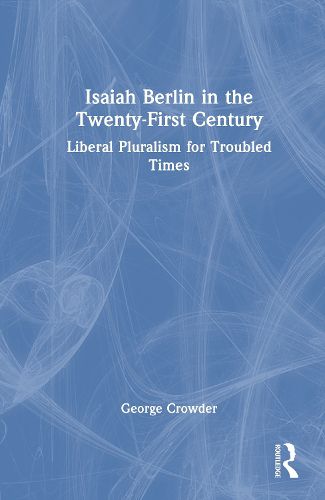Readings Newsletter
Become a Readings Member to make your shopping experience even easier.
Sign in or sign up for free!
You’re not far away from qualifying for FREE standard shipping within Australia
You’ve qualified for FREE standard shipping within Australia
The cart is loading…






Isaiah Berlin is well known as a defender of liberal democracy in the Cold War. In this path-breaking study, George Crowder argues that Berlin's ideas have application beyond their original context to the problems of our own time.
Focusing on three central themes - liberty, identity, and value pluralism - Crowder presents a fresh interpretation of Berlin, exposing the misunderstandings of critics, especially those who ignore Berlin's pluralist foundation. Although genuine problems remain, these can be alleviated by revising and extending Berlin's view to construct an updated liberal pluralism. Together with Berlin's own arguments, liberal pluralism is then brought to bear on a range of current concerns, including neoliberalism, identity politics, populism, international relations, religion, feminism, climate change, and global pandemics. The resulting outlook is complex, realistic, humane, and positive.
Isaiah Berlin in the Twenty-First Century represents a new departure in the study of Berlin, value pluralism, and liberal thought more generally. It is essential reading for researchers and advanced students in these fields, but its wide range will appeal to anyone interested in the values and politics of our troubled times.
$9.00 standard shipping within Australia
FREE standard shipping within Australia for orders over $100.00
Express & International shipping calculated at checkout
Isaiah Berlin is well known as a defender of liberal democracy in the Cold War. In this path-breaking study, George Crowder argues that Berlin's ideas have application beyond their original context to the problems of our own time.
Focusing on three central themes - liberty, identity, and value pluralism - Crowder presents a fresh interpretation of Berlin, exposing the misunderstandings of critics, especially those who ignore Berlin's pluralist foundation. Although genuine problems remain, these can be alleviated by revising and extending Berlin's view to construct an updated liberal pluralism. Together with Berlin's own arguments, liberal pluralism is then brought to bear on a range of current concerns, including neoliberalism, identity politics, populism, international relations, religion, feminism, climate change, and global pandemics. The resulting outlook is complex, realistic, humane, and positive.
Isaiah Berlin in the Twenty-First Century represents a new departure in the study of Berlin, value pluralism, and liberal thought more generally. It is essential reading for researchers and advanced students in these fields, but its wide range will appeal to anyone interested in the values and politics of our troubled times.